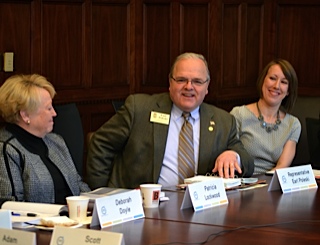
State Rep. Earl Poleski meets with the Michigan Municipal League Board of Trustees Friday, Jan. 24, 2014.
This morning Rep. Earl Poleski (R-Jackson), Chair of the House General Government Appropriations Subcommittee, addressed the League board to talk about the upcoming budget. The general government budget is the budget that contains revenue sharing and the Economic Vitality Incentive Program (EVIP).
Board members were direct with Rep. Poleski in discussing their frustration with funding cuts to revenue sharing and challenges with the EVIP program.
Utica Mayor and League President Jacqueline Noonan was concerned over Poleski’s comments about how new EVIP standards will look at legacy costs. Noonan explained many communities, hers included, have been doing all they can to address legacy costs and to now possibly get a requirement to do so is bothersome.
“At the very basic level I have some resentment that the Legislature seems to think that those of us in local government don’t know what we’re doing and that we haven’t already done all of these things,” Noonan told Poleski. “In fact, we are trying very hard – well intentioned, intelligently planning – to fund those legacy costs.”
Linden Mayor and Former League President David Lossing found it interesting that Governor Snyder in his recent State of the State address asked the federal government to distance itself from state government budget issues and yet the state of Michigan wants to be closely involved in local budget issues. He encouraged Poleski to form a work group to study and potentially reform three key areas of municipal financing – the personal property tax, Proposal A and the Headlee Amendment.
“As I listened to the governor’s State of the State address last week I find it really ironic that as he was calling for an amendment to the U.S. Constitution to get the Congress to consider to get the federal government out of state budget issue areas the state still intervenes on our local budget issue areas through EVIP,” Lossing said.
Grand Rapids Commissioner Rosalynn Bliss, MML board member, said the importance of placemaking and creating vibrant communities as a way to spur economic development throughout the state is seemingly not understood among lawmakers.
“I’m frustrated to hear over and over from state officials, ‘that we know what the problem is and we’ll fix it.’ We got to come up with a solution quickly,” Bliss said.
We appreciate Rep. Poleski’s taking time to address the board and answer tough questions. He expressed a willingness to explore changes to the municipal finance system as well as ways to deal with pension and OPEB obligations.
Samantha Harkins is the Director of State Affairs for the Michigan Municipal League. She can be reached at 517-908-0306 or email at sharkins@mml.org


